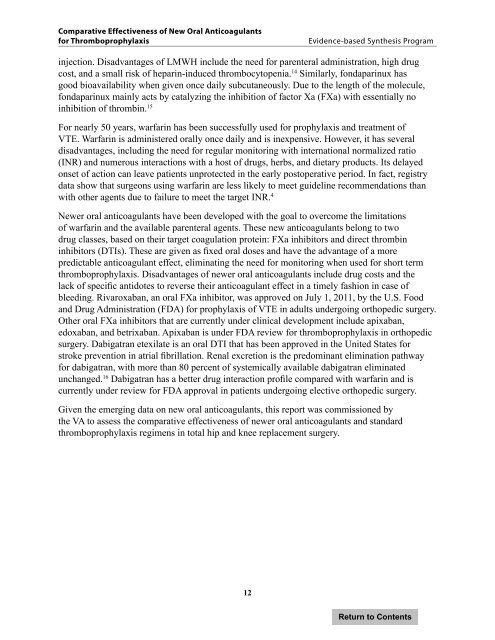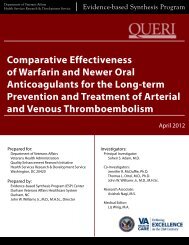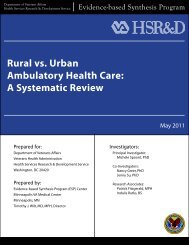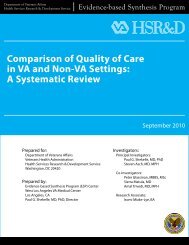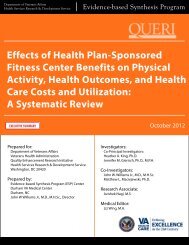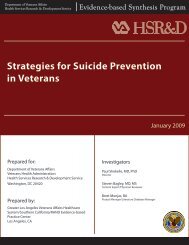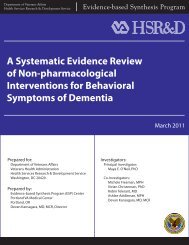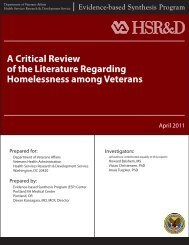Comparative Effectiveness of New Oral Anticoagulants for ...
Comparative Effectiveness of New Oral Anticoagulants for ...
Comparative Effectiveness of New Oral Anticoagulants for ...
You also want an ePaper? Increase the reach of your titles
YUMPU automatically turns print PDFs into web optimized ePapers that Google loves.
<strong>Comparative</strong> <strong>Effectiveness</strong> <strong>of</strong> <strong>New</strong> <strong>Oral</strong> <strong>Anticoagulants</strong><br />
<strong>for</strong> Thromboprophylaxis<br />
Evidence-based Synthesis Program<br />
injection. Disadvantages <strong>of</strong> LMWH include the need <strong>for</strong> parenteral administration, high drug<br />
cost, and a small risk <strong>of</strong> heparin-induced thrombocytopenia. 14 Similarly, fondaparinux has<br />
good bioavailability when given once daily subcutaneously. Due to the length <strong>of</strong> the molecule,<br />
fondaparinux mainly acts by catalyzing the inhibition <strong>of</strong> factor Xa (FXa) with essentially no<br />
inhibition <strong>of</strong> thrombin. 15<br />
For nearly 50 years, warfarin has been successfully used <strong>for</strong> prophylaxis and treatment <strong>of</strong><br />
VTE. Warfarin is administered orally once daily and is inexpensive. However, it has several<br />
disadvantages, including the need <strong>for</strong> regular monitoring with international normalized ratio<br />
(INR) and numerous interactions with a host <strong>of</strong> drugs, herbs, and dietary products. Its delayed<br />
onset <strong>of</strong> action can leave patients unprotected in the early postoperative period. In fact, registry<br />
data show that surgeons using warfarin are less likely to meet guideline recommendations than<br />
with other agents due to failure to meet the target INR. 4<br />
<strong>New</strong>er oral anticoagulants have been developed with the goal to overcome the limitations<br />
<strong>of</strong> warfarin and the available parenteral agents. These new anticoagulants belong to two<br />
drug classes, based on their target coagulation protein: FXa inhibitors and direct thrombin<br />
inhibitors (DTIs). These are given as fixed oral doses and have the advantage <strong>of</strong> a more<br />
predictable anticoagulant effect, eliminating the need <strong>for</strong> monitoring when used <strong>for</strong> short term<br />
thromboprophylaxis. Disadvantages <strong>of</strong> newer oral anticoagulants include drug costs and the<br />
lack <strong>of</strong> specific antidotes to reverse their anticoagulant effect in a timely fashion in case <strong>of</strong><br />
bleeding. Rivaroxaban, an oral FXa inhibitor, was approved on July 1, 2011, by the U.S. Food<br />
and Drug Administration (FDA) <strong>for</strong> prophylaxis <strong>of</strong> VTE in adults undergoing orthopedic surgery.<br />
Other oral FXa inhibitors that are currently under clinical development include apixaban,<br />
edoxaban, and betrixaban. Apixaban is under FDA review <strong>for</strong> thromboprophylaxis in orthopedic<br />
surgery. Dabigatran etexilate is an oral DTI that has been approved in the United States <strong>for</strong><br />
stroke prevention in atrial fibrillation. Renal excretion is the predominant elimination pathway<br />
<strong>for</strong> dabigatran, with more than 80 percent <strong>of</strong> systemically available dabigatran eliminated<br />
unchanged. 16 Dabigatran has a better drug interaction pr<strong>of</strong>ile compared with warfarin and is<br />
currently under review <strong>for</strong> FDA approval in patients undergoing elective orthopedic surgery.<br />
Given the emerging data on new oral anticoagulants, this report was commissioned by<br />
the VA to assess the comparative effectiveness <strong>of</strong> newer oral anticoagulants and standard<br />
thromboprophylaxis regimens in total hip and knee replacement surgery.<br />
12


